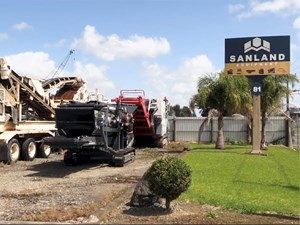Special feature: Dave Jenkins from TR Driver Training
Dave Jenkins talks to Deals on Wheels about his role with TR Group as a driver training specialist
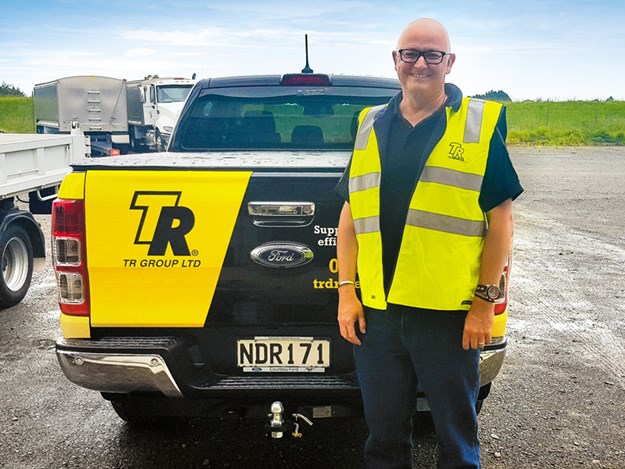 |
|
Dave Jenkins
|
Dave brings a wealth of experience to his regional manager role for TR Driver Training, which he started in November 2020. To put it simply, Dave trains the driving instructors and the trainers who train those instructors. It’s a complex job, as I found out.
"I’ve just notched up 26 years as a driving instructor and trainer," he tells me from his home in Feilding, where, like everyone else a few weeks back, he was stuck in Level 4 lockdown, but Dave used his time productively.
"I am still flat stick doing stuff. I’m spending my time revising training materials and making sure we’ve standardised our training schedules across the country. As a result, there are many team meetings. In the last lockdown, we greatly improved some of our outdated PowerPoint presentations. This time it’s a further opportunity to refresh everything."
Solid industry background
Dave’s history includes working as a coach driver and tour bus operator in Europe, Australia, and New Zealand. Doing tours of up to 70 days and maintaining the coach tested his mechanical skills.
Having relocated to New Zealand from Australia in 1995, he worked as a charter driver for a coachline in Palmerston North before retraining as a driving instructor. "At Salvation Army Employment Plus, I helped unemployed people retrain to get truck licences so they could get into the truck industry. I was there for 16 years and grew their training business nationwide.
"With the global recession in 2008, they decided that driver training wasn’t part of their mission statement, so I began my own business, Australasian Driver Training Services and took over many of their training contracts."
TR Group Driver Training
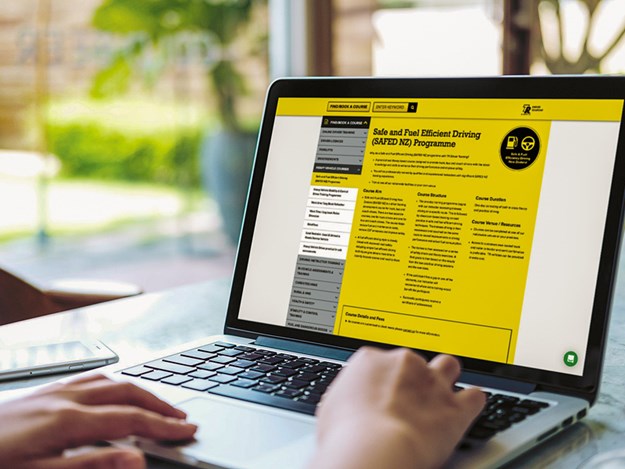 |
|
Many of TR Driver Training courses are now available online
|
Specialist truck and trailer rental lease company TR Group established their TR Driver Training division around six years ago. The overarching strategy is to support drivers to operate heavy vehicles as efficiently, safely, and compliantly as possible.
TR Training services include Class 2 to 5 licensing, endorsements, in-cab assessments, and all manner of courses designed to support the heavy transport industry. With 7500 trucks, TR Group is the biggest fleet owner in the country and TR Driver Training is one of the largest training companies.
"We have 20 highly qualified trainers and 12 training centres across the country: Auckland, Hamilton, Tauranga, Rotorua, Napier, Palmerston North, New Plymouth, Wellington, Nelson, Blenheim, Christchurch, and Dunedin," says Dave.
"Training delivers a variety of outcomes and our customers all have different priorities. Some are looking for better efficiency and for their fleet to run more cost-effectively, while others want to know their team can competently and safely operate gear.
For others, they want their drivers to develop personally and gain qualifications in the operating fleet. Whatever outcomes they want, we try to work with customers to deliver a training solution that suits," he says.
Data analysis
Increasingly, trucks are fitted with vehicle telematics, detailing how a vehicle is driven and performing. While it’s in its early stages, TR Group is also looking to support customers deliver better fleet performance by analysing this data and linking it with training programmes.
"We can break information down and understand things such as is there too much time in cruise control on hills, or not enough time in cruise control on the flats? We can look at data before and after training, compare the two, and say, today, we’ve had tangible savings. While its early days, we’re excited about how this will support TR Groups customers," says Dave.
Supporting professionals
 |
|
Driving trainer specialist Jane Dowdeswell delivers Class 5 instruction to a driver
|
Truck drivers are professionals and proud of their trade and the role they play in supporting New Zealand industry. And like all professionals, they want to get better at their craft. Training provides that opportunity and supports them to be better, safer, more efficient, and compliant operators.
Dave says he’s thoroughly enjoying his new position. "In my trainer support role, I monitor our trainers and make sure their knowledge base is where it needs to be, and if not, I help them achieve it.
As a driver training specialist, I spend time training the ones we have and monitoring the existing ones. Depending on the skill set of trainers in each location, we sometimes move trainers around to meet our customer’s needs."
In a pandemic world, with everyone rapidly learning to adapt, Dave can teach remotely.
"During lockdown last year, I did a corporate driver training seminar with groups in Invercargill and Palmerston North via Microsoft Teams, and it worked well."
Qualifying as an instructor or trainer
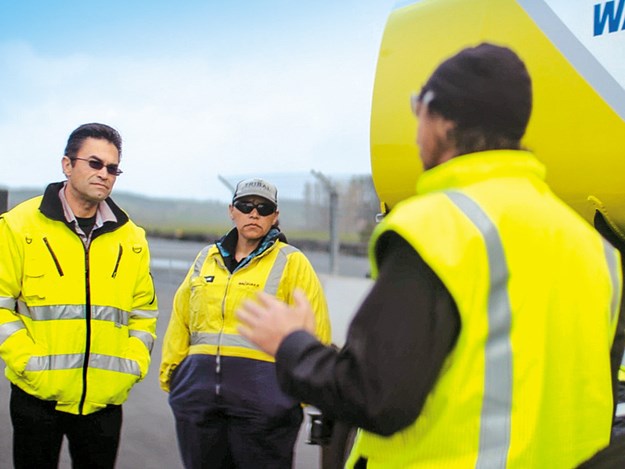 |
|
An instructor briefing a group ahead of a practical session
|
Learning to be a driving instructor or trainer is a massive challenge; Dave makes no bones about that. "You try and tell people it’s going to be full-on. It’s not until they get to the first or second day of their course and think what have they signed up to?
The good thing is at the end of it, they can say that they worked hard and achieved the qualification." The most effective driving instructors or trainers, according to Dave, are often those who have a solid industry background.
"If you’re going to sit with a 50-year-old truck driver and give him advice, then if you’re young or have had little experience, it’s going to be a stretch. Whereas if you’re older, it will make the job easier, especially if you’re moving into a training role," says Dave.
He adds that around 120 driving instructors qualify every year in New Zealand and about 50% will become heavy vehicle instructors. "Some will take on a role as an in-house company trainer; some want a career change. Community trusts with government funding put people through driver instructor training, which then helps less fortunate people get their car licences."
In addition to the vehicle training component, much of the learning is done in a classroom situation. "We do a lot of classroom presentations. As a trainer, I had to upskill to become an adult educator. At the time, there weren’t many resources available, so I had to learn how to pull together information reference materials."
Dave admits he wasn’t a textbook student, so he sounds surprised and rather proud when he says, "I seem to have a flair for training and teaching, and I enjoy passing on my knowledge.
If you want to be an instructor or trainer, you’ve got to have the will to share your knowledge and help people improve their skills. You’ve got to want to learn too. You’ll never know it all because technology is changing all the time. With electric and hydrogen vehicles coming, it will change how we do things, and we’ve got to keep up with it."
Raising the standard
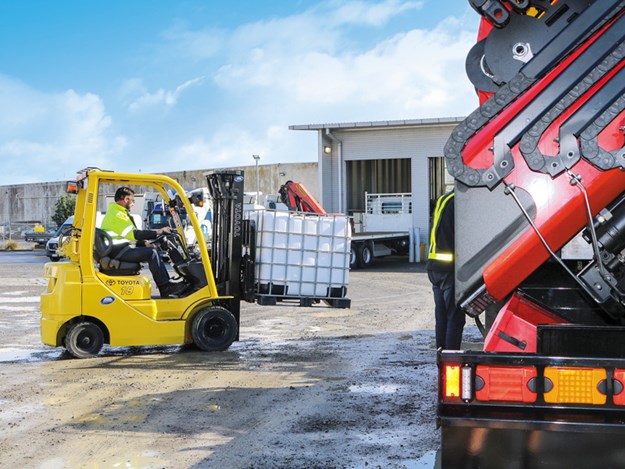 |
|
A participant learns how to load and restrain a heavy vehicle load
|
Dave says the New Zealand driver licensing standards are low compared to other places in the world. "Although they’ve toughened the test up, it’s still easier than the one I passed, aged 18, in Melbourne.
In my opinion, the Government is not spending time investing in training; instead, they look at the results: we have too many car crashes, so we’ll make roads straighter or lower the speed limits. They don’t think about teaching people to drive properly in the first place.
They’re putting the ambulance at the bottom of the cliff rather than the fence at the top.
"I compare it to building a house: getting a car licence is the foundation of our driving experience. If you don’t have good foundations, the house falls over. We want to give drivers sound skills at entry-level, so they carry that through to their truck and trailer licence."
Common mistakes
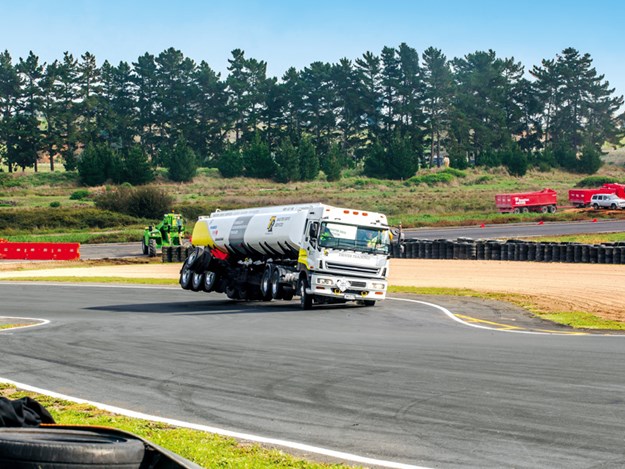 |
|
A training demonstration illustrates how easy it is for a tanker to roll
|
When asked what are some common mistakes drivers make, Dave says, "Drivers often drive a heavy vehicle as they would a car; you see things like not braking early enough or approaching intersections too fast.
Or they don’t understand the weight of the vehicle or how much momentum it’s carrying. Some of our training trucks have a water tank on them, and if they brake hard, you’ll stop at the lights, and the cab will be jumping up and down, while the water surges back and forth.
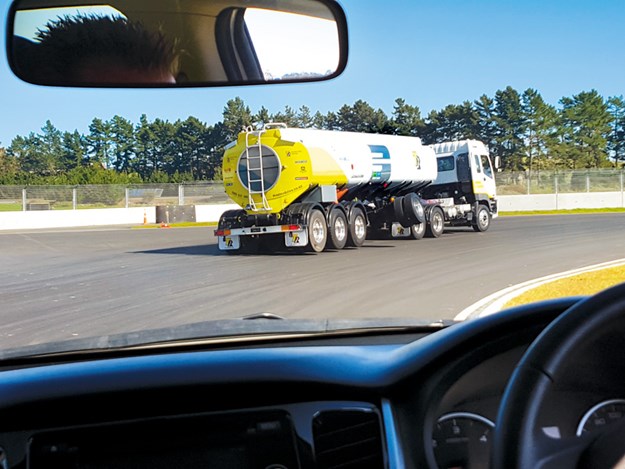 |
|
Rear observation of the tanker roll
|
The drivers look at you and ask what’s that? I tell them it was because they braked too roughly.’ "Truck driving is a technical job, and many people don’t realise this. There’s so much you need to know, and if you get it wrong, the fines are hefty.
It takes time to get through the licence classes that are designed to give people experience. Moving up the ladder takes time, and there’s a reason for that; it’s so people can crawl before they walk. You gain experience and cut your teeth on the smaller stuff first before you jump into a 50-tonne truck and trailer."
An industry issue
We often hear we need more truck drivers, but how will we get them? "That’s a complex problem, best explained by transport companies," says Dave. "The truth is transport is an industry with low margins and a lot of competitors.
It’s a tough game with long hours and pay rates that could be better. The people who get into trucking tend to do so because they love the gear. If you want to appeal to a wider pool of drivers, other factors will need to come into play, such as better pay or a subtle change in culture, so we see more women in the industry.
At TR Group, around 30% of our team are females, and we have two women in our training team as well. I like to think we’re part of leading and embracing a change in the industry."
Future goals
Dave’s next challenge involves learning more about electric and hydrogen vehicle technology. "We’ve just put three electric trucks into our rental fleet and have leased another 31. This is exciting new technology and part of the future of our industry."
It’s a game-changer, but as he says, learning never stops.
Find new and used trucks for sale in NZ
Keep up to date in the industry by signing up to Deals on Wheels' free newsletter or liking us on Facebook.





.jpg)


.jpg)



.jpg)
.jpg)
.jpg)
.jpg)

